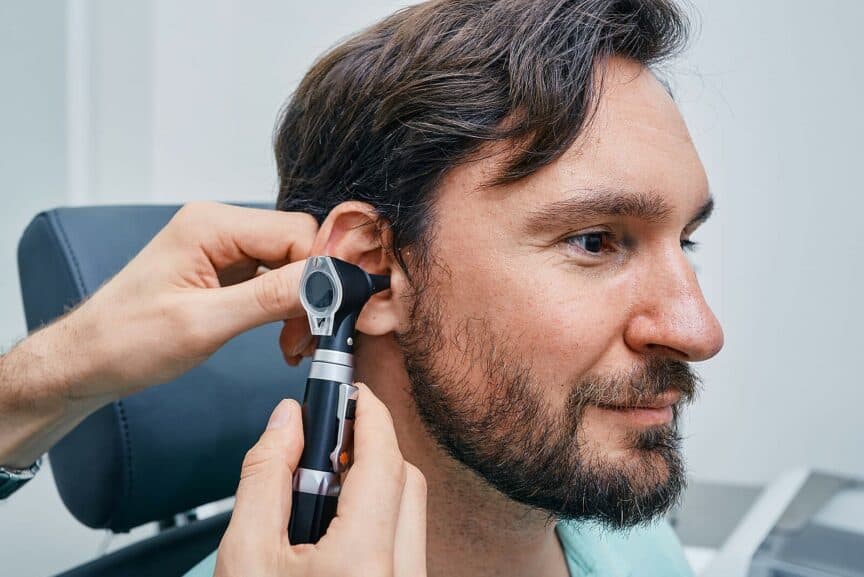Hearing loss is one of the most common health conditions that impact people today. Over 48 million people have some degree of hearing loss, making the prevalence of impaired hearing twice as common as diabetes or cancer. Hearing loss not only takes a toll on hearing and communication but various facets of everyday life including: relationships, social connection, work, and overall health. Learning more about hearing loss can help you prioritize your hearing health and intervene early if you experience any changes over time. Early intervention can significantly support hearing and transform the trajectory of your health.
What causes hearing loss?
There are several factors that can cause hearing loss. A few of the most common causes include:
- Aging: the risk of experiencing hearing loss actually increases with age. According to the National Institute on Deafness and Other Communication Disorders (NIDCD):
-
- 1 in 3 adults, ages 65-74, have some degree of hearing loss.
- 1 in 2 adults, ages 75 and older, have disabling hearing loss.
This can be caused by the cumulative impact of loud noise exposure on the auditory system, structure changes to the ears, or existing medical conditions that are linked to hearing loss and also impact older adults disproportionately.
- Loud noise: one time or regular exposure to loud noise can damage the sensory cells in the inner ear. This results in the brain receiving less auditory information, producing chronic noise induced hearing loss. According to the Hearing Health Foundation, over 30 million people are regularly exposed to hazardous noise levels.
- Medical conditions: there are several medical conditions that can increase the risk of hearing loss. This includes diabetes, heart disease, hypertension, and osteoporosis.
- Head injuries: head injuries involve significant force to the head which can cause hearing loss in a few ways including damaging the sensory cells in the inner ear, the bones in the middle ear, rupturing the eardrum, or damaging the areas of the brain that process auditory information.
Hearing loss can be experienced by people of all ages and backgrounds. Additional causes include inner ear disorders, autoimmune conditions, and ototoxic medications.
How can I tell if I have hearing loss?
Hearing loss typically occurs gradually so symptoms can be overlooked for quite some time. This often leads to a delay in treatment which can further worsen hearing loss. Being able to identify early signs can help you intervene early, common symptoms include:
- Tinnitus: a buzzing or ringing noise in the ears.
- Sounds are muffled or distorted.
- Struggling to hear in places with background noise (restaurants for example).
- Asking others to repeat what they said or to speak louder.
- Lip reading to help identify individual words.
- Turn up the volume on your electronic devices (TV, phone).
- Moving to a quieter space to be able to hear better.
- Finding yourself responding with “huh” or “what” often.
- Hearing is easier in one ear compared to the other.
- Keeping conversations short, avoiding conversations.
- Feeling drained after having conversations, social interactions.
These symptoms can be mild to more severe, depending on the degree of hearing loss being experienced. If any of these symptoms seem familiar and/or you notice that your hearing is in any way different, it is important to have your hearing health evaluated.
Can hearing loss be cured?
Sensorineural hearing loss is the most common type of hearing loss that people experience – accounting for 90% of the hearing loss people live with today. This occurs when the sensory cells in the inner ear are damaged. These cells, unlike other types that we have, do not regenerate and there are no ways to repair any damage they experience. This results in permanent hearing loss that cannot be cured. But it is important to know that there are effective ways that hearing loss is treated.
What is the treatment process?
The first step towards treatment is getting your hearing health evaluated. Hearing tests involve a painless process that measures hearing capacities in both ears. This identifies any hearing loss and the degree of impairment you are experiencing. Once your hearing needs are established, a hearing healthcare provider is able to tailor treatment to meet your specific hearing needs.
Contact us today to schedule an appointment for a hearing consultation. We look forward to helping you prioritize your hearing health and wellness.

